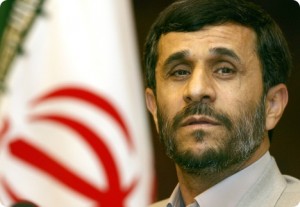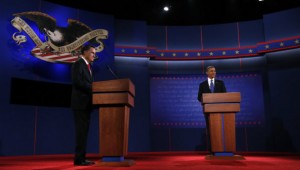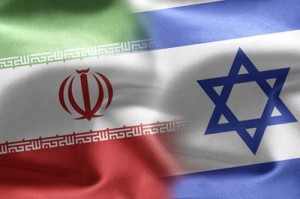US-Iran relations expert Trita Parsi explains why diplomatic headway can be made with Iran in the time period after the US presidential election and before the Iranian election in the Daily Beast’s “Open Zion“:
Between November 8, 2012, and mid-March 2013, a unique opportunity exists to make diplomatic headway [...]]]>
 US-Iran relations expert Trita Parsi explains why diplomatic headway can be made with Iran in the time period after the US presidential election and before the Iranian election in the Daily Beast’s “Open Zion“:
US-Iran relations expert Trita Parsi explains why diplomatic headway can be made with Iran in the time period after the US presidential election and before the Iranian election in the Daily Beast’s “Open Zion“:
Between November 8, 2012, and mid-March 2013, a unique opportunity exists to make diplomatic headway on the nuclear issue. The U.S. elections will be over and the White House will have maximum political maneuverability. This leeway was eaten away in 2009 by the Iranian election fraud and pressure from some U.S. allies and Congress, and didn’t exist this past summer, when political considerations prevented the U.S. from putting sanctions relief on the table.
By March of next year, the window will begin to close—not because of the American political calendar, but the Iranian one. After the New Year holidays, which start March 20, Iran enters its political season with presidential elections in June. Tehran will be politically paralyzed at least till the elections. If there is a repeat of the 2009 fraud, the paralysis could reign much longer.
But commentary from Tehran suggests that the entrenched Iranian leadership is unlikely to allow disgraced President Mahmoud Ahmadinejad to achieve foreign policy successes during the final months of his term. According to Mohammad Sadeq Kharazi, a top Iranian envoy and close adviser to Ayatollah Ali Khamenei (translation by Al-Monitor):
I reckon any kind of change in bilateral relations between Iran and America impractical and precluded until the holding of Iran’s presidential election. If they have understood well that the subject of foreign relations falls under the scope of the highest authority of the Islamic regime, namely the Supreme Leader, why weren’t they ready and aren’t ready to negotiate with Mr. Ahmadinejad and to solve the issues with his government? The government and president whose days left are ending fast and who enjoys a negative position inside the American political system because of some of the slogans he has offered.
He will continue to be framed as someone who, through mismanagement and bluster, brought about the enhanced sanctions regime, with Khamenei eventually taking charge and fixing the mess. He will have a hard time swallowing this reality and few believe that he will accept his checkmated predicament quietly.
Sunday’s New York Times story that the US and Iran have agreed in principle to direct bilateral negotiations over Iran’s nuclear program provides opportunity for a more honest conversation on Iran than the presidential candidates have had so far. Well, at least this is my hope.
I know the NYT [...]]]>
 Sunday’s New York Times story that the US and Iran have agreed in principle to direct bilateral negotiations over Iran’s nuclear program provides opportunity for a more honest conversation on Iran than the presidential candidates have had so far. Well, at least this is my hope.
Sunday’s New York Times story that the US and Iran have agreed in principle to direct bilateral negotiations over Iran’s nuclear program provides opportunity for a more honest conversation on Iran than the presidential candidates have had so far. Well, at least this is my hope.
I know the NYT report has already been rejected by the US and Iran. But the rejections on both sides have a similar quality. Despite the Iranian refusal to meet with the US in the talks that began in Istanbul last April, neither has rejected the possibility of bilateral talks as an outgrowth of the P5+1 process. And both have said that talks within the P5+1 frame will begin in late November (time and place to be determined). In any case, the P5+1 frame has increasingly become a venue dominated by US demands.
But the value of the NYT revelation or leak is not in the reporting of an agreement on a potential meeting but in the impact it may have on the nature of the conversation about Iran’s nuclear program. The reality is that the presidential race has so far managed to avoid the real Iran question. Certainly there has been grandstanding and threats. There was the frenzy over the need to set red line or deadline for Iran which was thankfully calmed — at least temporarily — by Prime Minister’s Benjamin Netanyahu’s inane performance at the UN.
The campaign has also been full of sounds bites regarding the seeming contrast between “having Israel’s back” and “not allowing daylight between Israel and the United States”. But there has been no conversation regarding the rapidly approaching decision time regarding Iran. No conversation regarding whether the United States, after years of offering what it knew would be refused, is willing to offer something that Iran can accept.
Everyone knows what the elements of the offer are: limits on levels of enrichment combined with a more robust inspection regime in exchange for calibrated reduction of some of the sanctions. There are many details to be worked out in difficult negotiations, but these details cannot even begin to be addressed without public acceptance of some enrichment in Iran or the acknowledgment of Iran’s proverbial “inalienable right.”
Why do I say that there is a rapidly approaching decision time for which direction to go in? Well, sanctions have worked to create economic havoc in Iran. No doubt both President Mahmoud Ahmadinejad and Leader Ali Khamenei are primarily responsible for the deteriorating conditions. But their responsibility lies not in their incompetence in managing the economy per se but in their miscalculation. Khamenei, in particular, suspected negotiations would not go anywhere (at least, this is what he keeps saying) but he failed to prepare the country for his publicized “resistance economy.”
A resistance economy cannot be created overnight; certainly not when the economic helm of the country is in the combined hands of a populist president who underestimated the force of sanctions and a cantankerous Parliament caught between the demands of higher ups and pressures from lobbies and constituencies.
Not that Khamenei does not want a deal. He does and the encounters of the past four years have exhibited his openness to talks whenever there was hope in or detection of a degree of flexibility in the US position. But these encounters have also shown that he perceives himself as standing at the helm of a highly contentious political terrain that demands addressing certain bottom lines for Iran.
With the draconian economic measures imposed on Iran in the past year, the same political terrain makes quite impossible the acceptance of a deal that does not bring about some immediate, palpable, even if small, relaxation of the sanctions regime.
Some would say that this is precisely why this is no time for flexibility on the part of the United States. It will be throwing a lifeline to Khamenei and “them,” whoever they are. Now that sanctions are working, going for the throat is the right thing to do, they say. In response to this argument, which is also prevalent among some in the Iranian Diaspora who yell hard, accusing any country negotiating with Iran of being a traitor to the cause of the Iranian people, I would say that they are not adequately aware of the social and ideological forces than can be mobilized inside Iran to maintain a defiant, albeit limping, country.
Unless Khamenei and company are given a way out of the mess they have taken Iran into (with some help from the US and company), chances are that we are heading into a war in the same way we headed to war in Iraq. A recent Foreign Affairs article by Ralf Ekeus, the former executive chairman of the UN special Commission on Iraq, and Malfrid-Braut hegghammer, is a good primer on how this could happen.
The reality is that the current sanctions regime does not constitute a stable situation. First, the instability (and instability is different from regime change as we are sadly learning in Syria) it might beget is a constant force for policy re-evaluation on all sides (other members of the P5+1 included). Second, maintaining sanctions require vigilance while egging on the sanctioned regime to become more risk-taking in trying to get around them. This is a formula for war and it will happen if a real effort at compromise is not made. Inflexibility will beget inflexibility.
An additional benefit from directing the conversation away from whether to attack Iran and how to sanction it further is the positive impact on the nuclear debate inside Iran. There is no doubt in my mind that the conversation that has focused on attacking or sanctioning Iran until it kneels or submits has had the effect of making the hardliners defiantly louder and silencing those pushing for the resolution of the “Amrika issue.”
The loudness of the defiant folks rests on a simple argument again articulated last week in no uncertain terms by Khamenei himself: America’s problem with Iran is not the nuclear issue and talks for the US are not intended to resolve the nuclear standoff; they are a means to extract surrender from Iran.
If Khamenei is not correct, then a clearer public articulation of the extent of compromises the United States may be contemplating in order to resolve the nuclear standoff can encourage a conversation inside Iran as well. My bet is that it will also empower those pushing for Iran to show a bit more flexibility in its bottom line.
]]>By Gary Sick
Every few months there is a concocted “crisis” involving suggestions that Israel is just on the verge of attacking Iran. This cycle started almost a decade ago, and it has repeated itself roughly annually, though sometimes more frequently.
In the early days, these alarms typically began with [...]]]>
By Gary Sick
 Every few months there is a concocted “crisis” involving suggestions that Israel is just on the verge of attacking Iran. This cycle started almost a decade ago, and it has repeated itself roughly annually, though sometimes more frequently.
Every few months there is a concocted “crisis” involving suggestions that Israel is just on the verge of attacking Iran. This cycle started almost a decade ago, and it has repeated itself roughly annually, though sometimes more frequently.
In the early days, these alarms typically began with a series of “leaks” by anonymous sources, usually to well connected Israeli or pro-Israeli reporters. For years it appeared that the US and world media would bite every time, with no apparent recollection that they had heard that tune before.
But when you have cried wolf so many times, even the main stream media, which loves an exciting story, begins to wonder if it is not being led by the nose. More important, over the past two years, as the veiled threats of an attack became ever more shrill, virtually the entire Israeli security establishment came out in opposition to such an operation. For a good summary, click here. Their reasoning was simple:
- Israel could not finish the job by itself; it could launch an attack by aircraft and cruise missile, which might do damage to the Iranian nuclear infrastructure, but Israel could not finish the job. For that, they needed the United States.
- A unilateral Israel strike would very likely speed up Iran’s nuclear weapon development; Iran might well withdraw from the Non-Proliferation Treaty, kick out the IAEA inspectors who are our eyes and ears on the ground, and announce that, since they had been attacked by a nuclear weapons state, they were no longer bound by their pledge not to produce a weapon.
- The entire Persian Gulf region would be thrown into chaos and the price of oil would probably go sky high for some time. The costs to delicate world economies, still struggling to recover from the Great Recession, would be severe.
- The Iranian people, at least initially, would probably rally around their hard line leadership, as they have in the past when their national sovereignty was challenged. The Green reform movement would be undercut, since they would not dare associate themselves with external invaders.
- The United States would be blamed (and not only by Iran) for complicity in the attack, regardless of whether it was true. Iran and its allies might well retaliate against US military and civilian targets, in addition to Israel, thus sparking a much wider regional conflict.
- If an air strike did not work, the logical next step would be to go after the leadership. And, as we learned in Iraq, that means boots on the ground.
In short, an Israeli (or American) attack would very likely leave the situation much worse than it was before taking military action. Israel’s security would not be improved; in fact, it might be imperiled by the negative response of even Israel’s closest allies. And Iran’s creeping approach to nuclear capability might turn into a sprint.
This awareness of the “day after” effect has persuaded many security specialists that an Israeli attack would be the very definition of a Pyrrhic victory.
It is worth remembering that Israel acquires significant leverage from this constant perception of imminent war. By keeping the Iranian nuclear case at the forefront of the world’s media, political leaders everywhere are more likely to pay a price in the form of lost revenues and political sparring with Iran, rather than facing the calamity of an outright war.
The problem is that economic sanctions and covert interference with Iran’s nuclear program have been pushed to such a level that they are morphing into outright economic and political warfare. Iran has lost roughly fifty percent of its national income in the past six months, in addition to a series of assassinations and cyber attacks on its infrastructure. Inflation and unemployment are soaring — affecting all levels of society, especially the poor. There is no longer even the pretense that these are “smart” sanctions directed only at Iran’s political and military leadership.
Iran has responded to this onslaught by entering into negotiations and offering some compromise positions, such as potentially terminating its uranium enrichment to the 20 percent level and eliminating its stockpile of such uranium. But the US and its allies have taken a hard line position that Iran must cease ALL enrichment if they want to see any relief from the sanctions.
It is doubtful that the US can make any significant concessions during an election year, and Iran has shown little willingness to yield to the pressure by terminating all uranium enrichment.
That is the context for the latest crisis about a possible Israeli attack.
Based on the experience of a decade of such crises, all of which faded away with no military action, I can only be skeptical. I am aware that “This is the Middle East…” i.e. that nations are capable of acting against their own interests in the hysteria of the moment.
My only concern is that Prime Minister Netanyahu, having made the case so often and so publicly for Israel’s right and even duty to attack, will have painted himself into a corner where there is no escape without actually risking national catastrophe.
Yes, that is a possibility. But I have sufficient confidence in the operation of Israeli democracy and the instinct for self preservation of its leaders to regard that possibility as vanishingly small.